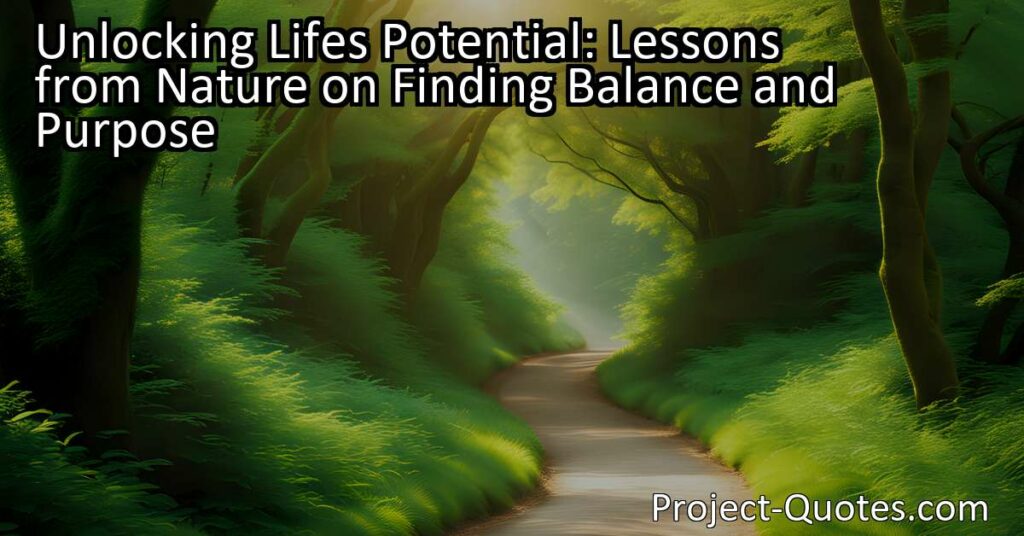If one way be better than another, that you may be sure is natures way.
Aristotle
Unlocking Life’s Potential: Lessons from Nature on Finding Balance and Purpose Explore Aristotle’s perspective on the wisdom of nature and how it can guide us in making choices. By observing nature’s balance, moderation, and virtuous behaviors, we can learn valuable lessons that lead to a fulfilled life and align with our unique purpose. Nature serves as an insightful teacher, offering valuable lessons on finding the right path and unlocking life’s potential.
Table of Contents
Meaning of Quote – If one way be better than another, that you may be sure is natures way.
The Wisdom of Nature: Aristotle’s Perspective on Finding the Right Path
Introduction
—
“Ancient Greek philosopher Aristotle once stated, ‘If one way be better than another, that you may be sure is nature’s way.’ These profound words invite us to reflect upon the wisdom inherent in nature and the guidance it can offer us in making choices. In this article, we will delve deeper into Aristotle’s perspective on the subject, exploring how nature serves as an insightful teacher when it comes to discerning the right path. By embracing Aristotle’s teachings, we can learn to lead enriched and balanced lives in harmony with the natural world.”
I. Understanding Aristotle’s Concept of Nature
—
Aristotle believed that nature had an intrinsic order and purpose. For him, nature encompassed everything in the physical world, including plants, animals, and humans. He proposed that nature possesses an innate wisdom that can guide us towards the best course of action if we pause to observe and understand it. Aristotle recognized that various systems in nature operate harmoniously, with each element performing its unique function to contribute to the overall equilibrium. By closely examining the natural world, we can gain insights into how to make beneficial choices in our own lives.
II. Nature’s Balance and the Art of Moderation
—
One concept Aristotle emphasized was the importance of moderation, often referred to as the golden mean. He believed that nature always sought balance by avoiding extremes. For instance, in observing the cycles of day and night, he saw that excessive light or darkness brought chaos, whereas a proper balance ensured harmony. Nature’s tendency toward moderation extends to many aspects of life, such as eating, exercising, and even social interactions.
By examining how animals navigate their environments without excess, Aristotle highlighted that nature’s lessons can also be applied to human behavior. For instance, while ambition can motivate us to achieve great things, excessive ambition may lead to destructive behavior. Conversely, a lack of ambition may result in stagnation. Therefore, embracing the middle ground and finding a balance in our pursuits allows us to lead fulfilling lives while avoiding potential pitfalls.
III. Nature as a Moral Guide
—
Aristotle believed that nature could also teach us valuable lessons about morality. According to his ethical theory, human beings have an inherent predisposition to act virtuously, which he defined as the expression of qualities like courage, generosity, and kindness. Aristotle argued that the natural world displays analogous virtuous behaviors that we can look to for guidance.
Observing how animals care for their young, cooperate within their communities, and preserve their ecosystems offers insights into nurturing relationships, fostering collaboration, and protecting the environment. Through nature, Aristotle recognized the importance of cooperation and empathy, which can guide our moral decisions, leading to harmony within societies and an enhanced connection to the world around us.
IV. Aligning with Nature’s Purpose
—
For Aristotle, understanding nature’s purpose is vital to finding the right path. He believed that, like everything in the natural world, humans also have a unique purpose or telos. Discovering and aligning with this purpose allows individuals to lead fulfilling lives, contributing to the greater good while finding personal fulfillment.
Nature provides a rich tapestry of possibilities, each with its own purpose. Just as a tree grows and provides shelter, animals offer companionship, and plants provide sustenance, individuals too possess specific talents, aptitudes, and passions that can guide them towards their telos. By observing nature’s diversity and interconnectedness, we can glean insights into our own individuality and how we can best contribute to society.
Conclusion
—
Aristotle’s reflection on nature’s wisdom provides a valuable framework to navigate life’s complexities. By observing and aligning with the principles found in the natural world, individuals can discover a path guided by balance, moderation, virtue, and purpose. In finding harmony with nature, we can develop a greater sense of self-awareness, connect more deeply with our environment, and make choices that lead to a fulfilled life. As we immerse ourselves in nature and learn from its wisdom, we gradually uncover the innate wisdom within ourselves.
I hope this quote inspired image brings you hope and peace. Share it with someone who needs it today!


